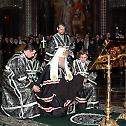Theology
Philosophy of Upbringing in Writings of St. John Chrysostom
20. September 2013 - 12:43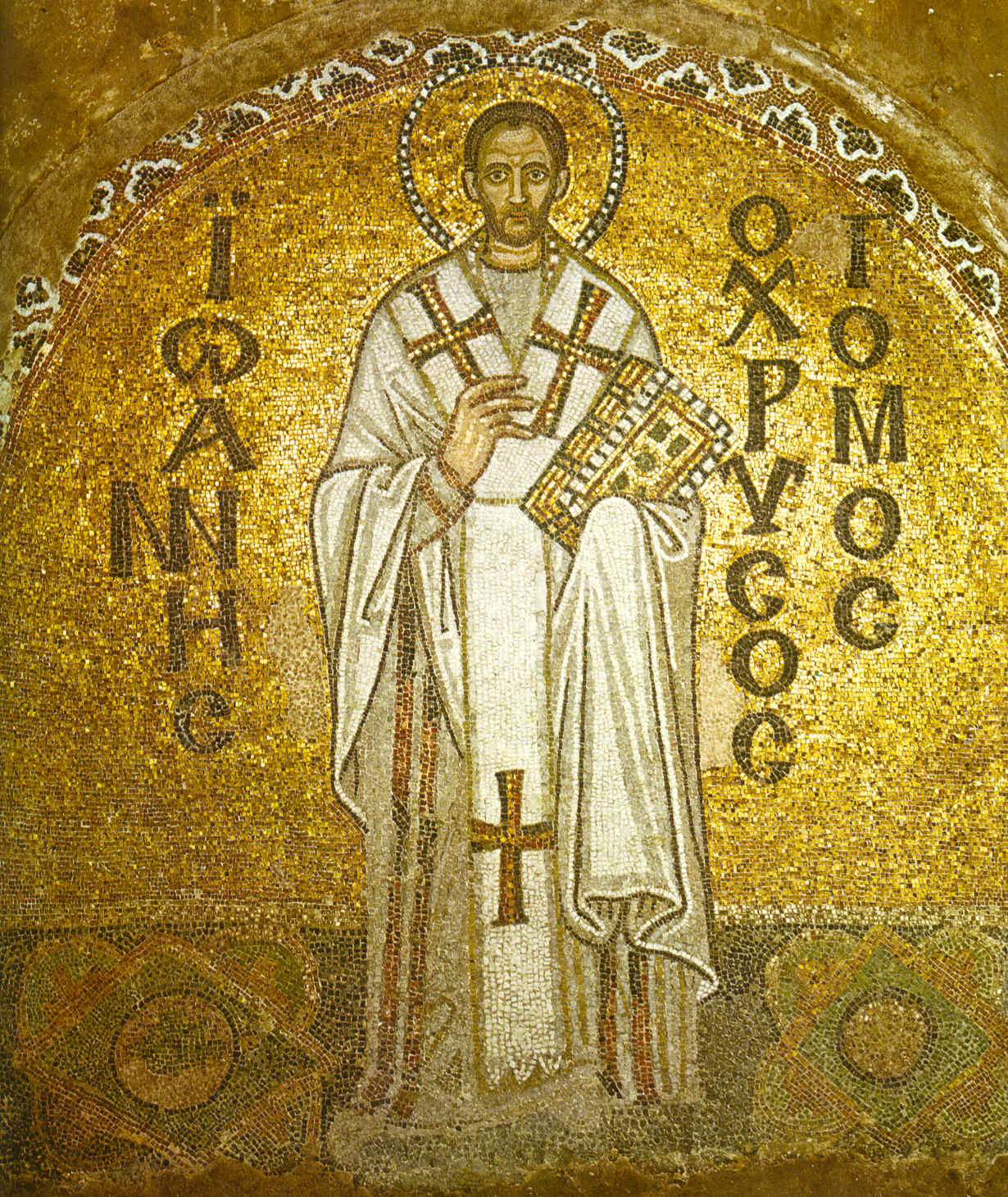 Bishop Dr. Jovan (Puric)
Bishop Dr. Jovan (Puric)
Christian pedagogy fully reached its historic maturity and comprehensiveness in the life and words of John Chrysostom. By the epoch of Chrysostom it had experienced turbulent centuries of interaction between Christian and Antique cultural influences, although the matter of civilization frameworks of Christian pedagogy was especially acute at the time of Chrysostom as well. With his comprehensive education, which included the knowledge of both Antique Hellenistic and ecclesial, Old and New Testament paideia, Chrysostom, following great Cappadocian Fathers before him and St. Maxim the Confessor after him, confirmed the readiness of Christian pedagogy to accept and integrate, in a transforming way, the most important achievements of Antique pedagogy and thereafter use them creatively.
The Dormition of Our Most Holy Lady Theotokos and Ever Virgin Mary
30. August 2013 - 15:25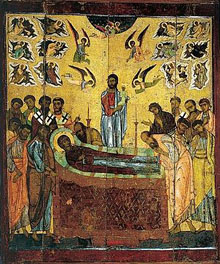 The Dormition, or "Falling Asleep"
The Dormition, or "Falling Asleep"
After the Lord’s Ascension, the Mother of God remained under the care of the Apostle John the Theologian, and when he was absent, she lived in the house of his parents, near the Mount of Olives. For all the Apostles and all the faithful, she was a consolation and edification. Talking with them, the Mother of God told them of the wondrous events of the Annunciation, the conception without seed, and her birth of Christ without corruption, His childhood and earthly life. Like the Apostles, she instructed and strengthened others in the Christian Faith by her very presence, words, and prayers. The Apostles’ reverence for the Most Holy Virgin was extraordinary. Upon receiving the Holy Spirit on the remarkable day of Pentecost, they remained in Jerusalem for about ten years, serving for the salvation of the Jews and wishing to see and hear her divine words as often as possible. Many of the newly-enlightened in the faith even came from distant lands to Jerusalem in order to see and hear the Most Pure Theotokos.
Forgiveness Sunday
18. March 2013 - 12:57In the Orthodox Church, the last Sunday before Great Lent – the day on which, at Vespers, Lent is liturgically announced and inaugurated – is called Forgiveness Sunday. On the morning of that Sunday, at the Divine Liturgy, we hear the words of Christ:
"If you forgive men their trespasses, your heavenly Father will also forgive you, but if you forgive not men their trespasses, neither will your Father forgive your trespasses..." (Mark 6:14-15)
Zechariah Orfelin’s manuscript found
27. February 2013 - 11:55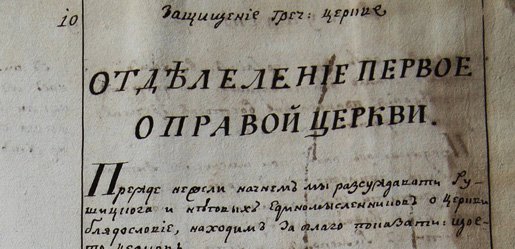 During the first phase of the project “Digitalization, revision and expert processing of handwriting fund of the Library of the Serbian Patriarchate – compilation of the inventory of manuscripts”, a manuscript no. 214 was noticed. In its short description we found out that Zechariah Orfelin wrote this manuscript in XVIII century in Slavoserbian, and it has 927 pages. Knowing that in the literature about Orfelin is one monumental and controversial manuscript, known as Against Roman Papacy, which has been lost for a half of a century. We wonder whether this is that manuscript, which is the very significant work, both for theology and the national history of the Serbs in XVIII century?
During the first phase of the project “Digitalization, revision and expert processing of handwriting fund of the Library of the Serbian Patriarchate – compilation of the inventory of manuscripts”, a manuscript no. 214 was noticed. In its short description we found out that Zechariah Orfelin wrote this manuscript in XVIII century in Slavoserbian, and it has 927 pages. Knowing that in the literature about Orfelin is one monumental and controversial manuscript, known as Against Roman Papacy, which has been lost for a half of a century. We wonder whether this is that manuscript, which is the very significant work, both for theology and the national history of the Serbs in XVIII century?
Bishop Jovan of Nis at International Conference in Varna
21. February 2013 - 13:41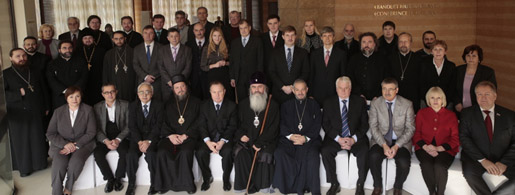
His Grace Bishop Dr. Jovan of Nis participated in the 19th International Conference on the theme Traditional Values and Democratic Freedoms in Modern World, in Varna beginning on 18 February 2013. After the introductory address, in which he conveyed warm greetings from both Serbian Patriarch Irinej and the members of the Holy Synod of Bishops of the Serbian Orthodox Church, Bishop Jovan delivered a lecture on the theme: Saint John Chrysostom: Liturgical Ethos and Modernity.
Homily on the Meeting of the Lord
18. February 2013 - 13:20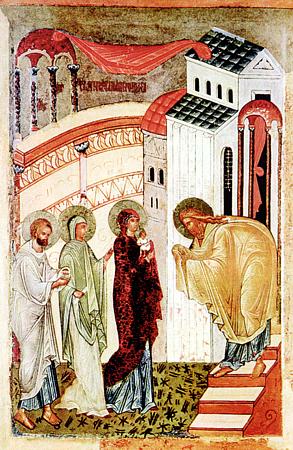 What a tender scene the Meeting of the Lord shows us! The venerable elder Simeon, holding the infant God in his hands, on either side of him are the righteous Joseph and the Most Holy Mother of God. Not far away is the Prophetess Anna, an eighty-year-old faster and woman of prayer. Their eyes are all directed toward the Savior. Their attention is absorbed by Him and they drink in spiritual sweetness from Him, which feeds their souls. You can judge for yourself how blessed was the state of these souls!
What a tender scene the Meeting of the Lord shows us! The venerable elder Simeon, holding the infant God in his hands, on either side of him are the righteous Joseph and the Most Holy Mother of God. Not far away is the Prophetess Anna, an eighty-year-old faster and woman of prayer. Their eyes are all directed toward the Savior. Their attention is absorbed by Him and they drink in spiritual sweetness from Him, which feeds their souls. You can judge for yourself how blessed was the state of these souls!
However, brethren, we are called not only to think about this blessedness, but also to taste it in reality, for all are called to have and carry the Lord in themselves, and to disappear in Him with all the powers of their spirit. When we have reached that state, then our blessedness will be no lower than that of those who participated in the Meeting of the Lord. They were blessed who saw it; we shall be blessed who have not seen, but believed. Pay attention. I will show you briefly how to achieve this. Here is what you should do.

